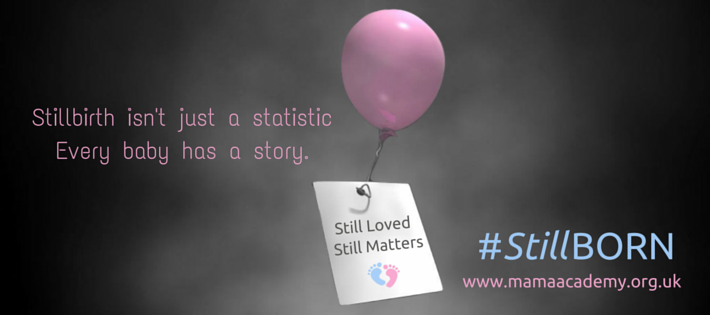StillBORN Campaign
MAMA Academy has launched #stillBORN, a national campaign to share the stories of parents and their precious babies who were sadly stillborn. We aim to break the taboo of baby loss so that parents of stillborn babies finally have a voice to share their baby’s story so that lessons can be learned for future maternity care. There is still a huge myth surrounding stillbirth – that it’s inevitable, “meant to be”. However the majority are actually preventable. It’s time to break the silence surrounding these deaths and to also improve bereavement care across the country.
Our StillBORN campaign not only highlights key pregnancy information to help mothers have a safer pregnancy, but also promotes the resources and programmes readily available to trusts to help them reduce stillbirth in their local area. We shall also be highlighting positive stories of survival, where the NHS has provided exceptional care, going above the call of duty to save babies lives. Our aim is for our NHS to be valued and appreciated so that good as well as bad decisions can be learnt from.
The Lancet Ending Preventable Stillbirths series (19th January 2016) reported that the UK ranks 21st out of 186 countries in the world for stillbirth rates and that we are making very slow progress in reducing stillbirth numbers. The research provides compelling evidence of the preventability of most stillbirths. Read the full report here.
Currently, not all hospitals in the UK are fully investigating all their perinatal deaths. MAMA Academy’s CEO, Heidi Eldridge, says: “The heartache of losing a child cannot be described as the grief stays with you forever. Every stillbirth matters as every baby still has a story. The majority of stillbirths are potentially preventable so it’s vital that all trusts carry out an independent investigation to learn from potential lessons which may help to prevent a similar tragedy occurring in the future.”
Sadly over 5600 babies are stillborn or die shortly after birth every year in the UK, which amounts to over 100 every week and UK figures are only just starting to decrease for the first time in 20 years. The UK has one of the highest stillbirth rates in the developed world and MAMA Academy aims to change this.
Preventing Stillbirths
Watch our founder, Heidi Eldridge, talk about what it’s like to have a Rainbow baby and the inspiration behind reducing stillbirths in your unit.
MAMA Wellbeing Wallets form part of NHS England’s stillbirth strategy and are distributed via various trusts across the UK to help mums have safer pregnancies. The wallets are given to mums by their midwife at the booking in appointment and help keep their antenatal notes safe. They are printed front and back with key health messages and act as a check list for midwives to discuss important topics with mums such as how to monitor their babies movements. We need your help to fund more.
Our Made to Measure campaign aims to save babies’ lives by calling all UK trusts to adopt the Perinatal Institute’s GAP programme. GAP uses customised growth charts alongside a package of training and support to better detect growth restricted babies, a key risk factor for stillbirth.
Measure symphysis fundal height accurately and plot measurements on a customised growth chart.
Empower expectant mothers with safer pregnancy information. We have been working closely with the Department of Health and Sands on essential information for mums such as how to monitor babies movements and recognise signs of infection and pre-eclampsia.
Implement elements of the NHS Saving Babies Lives care bundle such as monitoring babies growth via the GAP programme, reminding mothers to report reduced movements and develop a pathway for when a mother expresses concerns, continuous monitoring during labour with adequate CTG interpreters and carbon monoxide testing.
Screen for diabetes. The MBRRACE Perinatal confidential enquiry 2015 reported that glucose tolerance testing was not offered in cases with an identified risk factor and so there was no opportunity for closer monitoring.
Screen for Vasa Praevia at the 20 week ultrasound scan. Vasa Praevia is thought to occur in over 500 babies a year. By diagnosing the condition during pregnancy, the survival rate is 100% as the baby will be delivered by C-section.
Screen and treat Group B Strep Infection. There is a highly sensitive test specifically for detecting group B Strep carriage called the Enriched Culture Method (ECM) test. It is prescribed by Public Health England but it is not widely available in the NHS. The NHS trusts which offer this test are listed on the Group B Strep Support website, together with organisations that offer this test privately.
Trust mothers instincts and know when to call the midwife. If in doubt, get checked out. Maternity staff are available 24 hours, 7 days a week to listen to your concerns. If you would like a second opinion during your maternity care, ask to speak to the Supervisor of Midwives who will be able to offer you impartial advice.
Continuity of care. There is evidence to suggest that mothers who are seen by the same midwife or small team of midwives has a great impact on safe, high quality maternity care.
Every baby death could be investigated by an independent external inquiry via SCOR software. A new review tool is also being developed by Sands and the Department of Health entitled “Standardised Perinatal Morality Review Tool” which should be available by the end of this year.
stillBORN: Babies who still matter
Stories of potentially preventable stillbirths and survivals:
